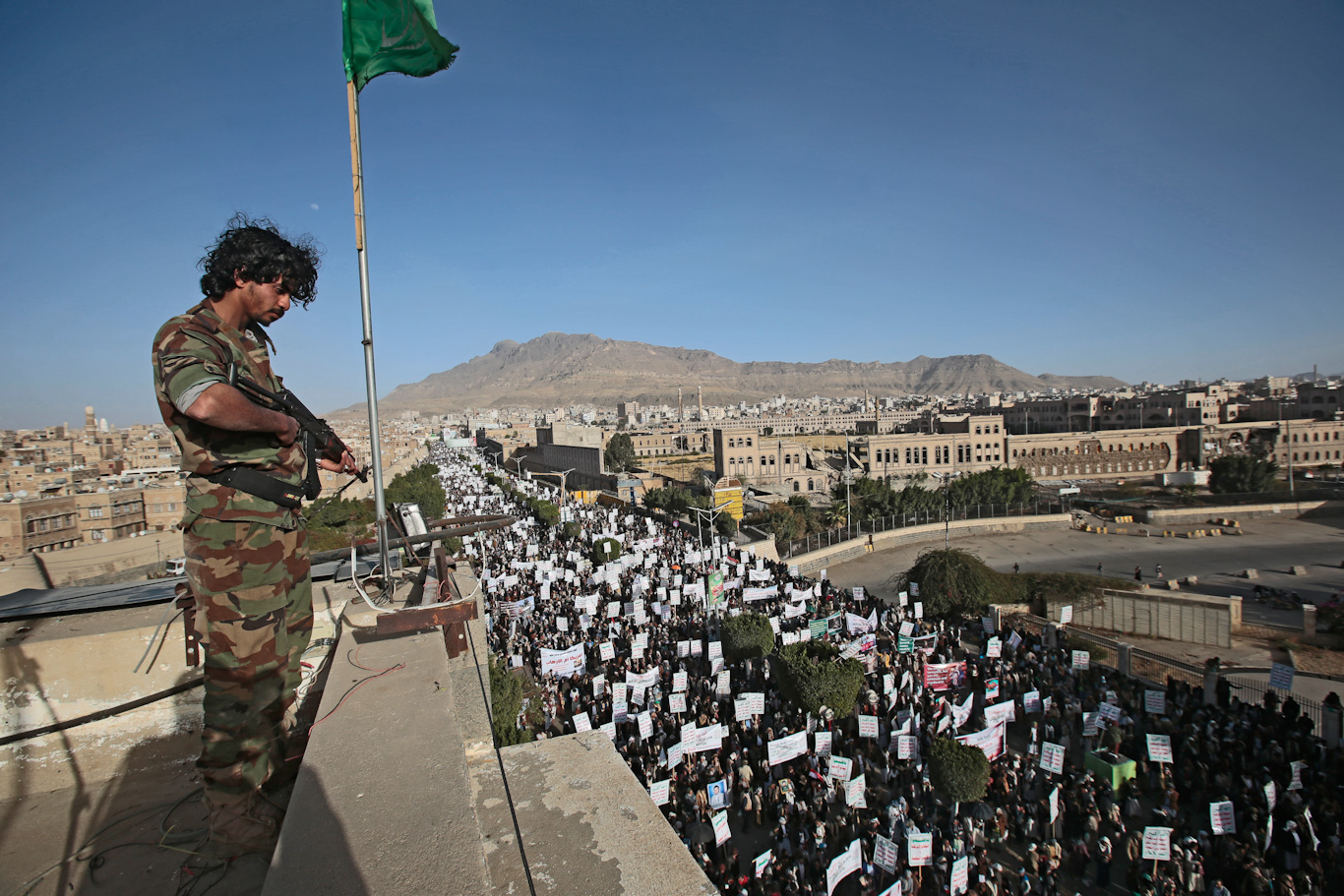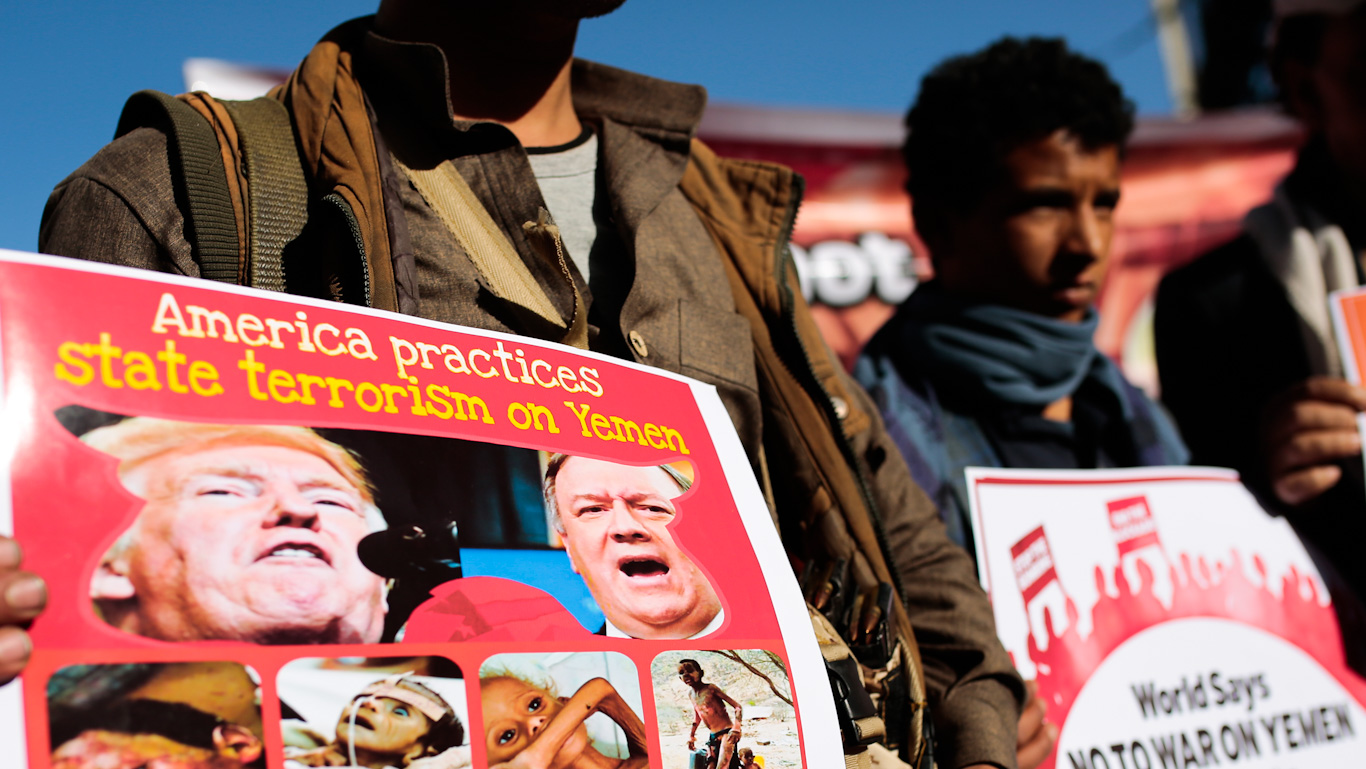HAJJAH, YEMEN, NEAR THE SAUDI BORDER — “We thought that aid from the U.S. would feed our children, not that American sanctions would see them dying from hunger,” a Yemeni father who wished only to be called J. A. from the border city of Abs near Saudi Arabia told MintPress.
The only income J.A. has to feed the twenty family members under his care is the money transfer that comes in at the end of every month. He receives 500 Saudi riyals from his expatriate son in Saudi Arabia who works in a laundromat. That money, though, will no longer be able to make it to Yemen as exchange companies are canceling foreign remittances to the country amid sanctions imposed by the outgoing Trump administration. ”Either we die by a U.S. bomb or U.S. sanctions, it is the same, is this the America that everyone dreams of?” J. A. asked.
The last-minute decision by the former Trump administration to designate Ansar Allah as a “foreign terrorist organization” has sparked concern from the thousands of Yemeni families that depend on remittances sent home from relatives working abroad, which represent millions of dollars annually. According to J.A, the repercussions of the designation have already started to harm his family, who is powerless as money exchanges and banks in the Saudi city where his son works have refused to transfer money to Yemen, arguing that Abs is under the control of Houthis (Ansar Allah).
Sources in Sana’a, including Houthi officials, charities, banks, and exchange shops, told MintPress that international banks, exchange shops, and firms have already ceased participating in commercial or financial transactions with Yemenis, including those exempted for humanitarian transactions, due to the fear of triggering U.S. sanctions.
Popular resistance
Despite being a staunch opponent of Ansar Allah, J.A. took to the street on the highway road linking Hodeida and Hajjah to protest against the sanctions. There, thousands of residents, including Ansar Allah supporters, sympathizers as well as those at odds with the group, carried banners reading “America is the mother of terrorism!” Protesters shouted “Who is killing the Yemeni people?” while others retorted, “America!”
Like the residents in the border city of Abs, hundreds of thousands of Yemenis took the streets in 17 major cities including Sana’a, Hodeida, Hajjah, and other cities to show support for Ansar Allah and reject the designation of the movement as terrorists. They called on President Biden to end support to the Saudi-led coalition and reverse the decision they say punishes a nation reeling from war and a blockade imposed by Washington’s allies in the region.
The protests drew crowds from across all parties and workers, including engineers, farmers, and civil defense. Doctors and aid workers wore their uniforms and marched side by side with money changers, business owners, civil society organizations, and local relief organizations. Most religious groups in Yemen, including Shafa’is, Zaydis, and others, as well as most major national parties, were also among the protests.
In Yemen’s capital city of Sana’a, hundreds of thousands gathered at Bab al-Yemen carrying Yemeni flags and holding banners. While others gathered in front of the shuttered U.S. Embassy, raising their fists up as they chanted slogans against former U.S. President Donald Trump. Some tore American flags while others trampled on them with their feet.

In Hodeida, Mohammed Ali al-Houthi was the keynote speaker at a rally where he delivered a sermon to hundreds of thousands of protesters. “We are not afraid of Americans, and our nation is standing firmly in the face of threats and aggression,” he said. Al-Houthi called on Biden to impose an embargo on sending weapons, warplanes, and logistical support to Saudi Arabia and its allies instead of designation a political movement fighting against a foreign invasion as terrorists. The Biden administration for its part recently suspended arms sales to both Saudi Arabia and the UAE and rolled back some sanctions on the Houthis but did not remove the terrorist designation imposed by the Trump administration.
Yemenis at home were not demonstrating alone. Dozens of rallies were held by Yemeni expatriates and foreign activists in cities like Washington DC and San Francisco, Hamilton in Canada, Britain, Austria, Italy, and other countries. A virtual demonstration was also held by more than 250 organizations around the world. All called for an end to the war, a lifting of the blockade, and the cancellation of U.S. sanctions. To many of the protesters who spoke to MintPress, the designation exposes Washington as a belligerent actor that has knowingly harmed them for the past six years under the pretext of fighting Iranian influence and returning the ousted president Hadi to power, arguments that have been repeated by the Houthis since 2015, when the war began.

The massive demonstrations in Yemen coincided with the international day of action, a day in which more than 230 anti-war and humanitarian organizations from 17 countries across the world including the United States, Canada, Britain, France, Germany, Austria, Italy, Denmark, Finland, India, Netherlands, Chile, Sweden, Spain, South Korea, Switzerland, and Yemen came together to call for an end to the war.
The organizations demanded in a statement that their governments immediately “stop foreign aggression on Yemen; stop weapons and war support for Saudi Arabia and the United Arab Emirates; lift the blockade on Yemen and open all land and sea ports; and restore and expand humanitarian aid for the people of Yemen.”
Blowback
Major General Khaled Baras, the Head of the Southern Movement, one of the many groups that participated in the National Dialogue held in 2014, said in the wake of the massive demonstrations that the U.S. decision lacks logic when tens of millions of defenders of their homeland are accused of terrorism. “Ansar Allah are not terrorists. We as southerners reject this decision. The former American administration accused millions of Yemenis of terrorism and with them tens of millions of supporters and defenders of the homeland. This is ridiculous,” he said.
Experts warn that the U.S. designation could not only sabotage the peace in the war-torn country but could seriously imperil the U.S.’s diplomatic credibility and its prospects to play any mediating role in future negotiation talks to end the war or the release of foreign captives, including Americans held on charges of spying or participating in the war. Any realistic settlement would also have to include the Houthis, no matter how irritating that may be to Washington and its Gulf allies.
Regardless of the wide popularity of Ansar Allah among Yemenis, reflected in part by the large demonstrations which took place on January 25 due to their outsized role in the resistance against the Saudi war, almost 80% of Yemenis live in areas under Houthi control, including the country’s capital Sana’a and the major port of al-Hodeida. And at least 80% of the population – 24.1 million people – require humanitarian assistance, more than half of them facing starvation. Consequently, the U.S. sanctions will inevitably push more Yemeni civilians closer to famine.
Officials in Sana’a who spoke to MintPress remain defiant and say the sanctions will not affect them. They argue that they already have elements operating in other capitals like Tehran and Muscat and that the designation will only increase their popularity internally and acquaint them to other countries facing U.S. aggression, such as “China and Russia.”
Feature photo | Houthi supporters hold posters as they attend a demonstration against the United States over its decision to designate the Houthis a foreign terrorist organization in Sanaa, Yemen, on Jan. 25, 2021. Hani Mohammed | AP
Ahmed AbdulKareem is a Yemeni journalist. He covers the war in Yemen for MintPress News as well as local Yemeni media.


